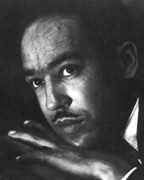|
|
|

 In 1923, Hughes traveled abroad on a freighter to the Senegal, Nigeria,
the Cameroons, Belgium Congo, Angola, and Guinea in Africa, and later
to Italy and France, Russia and Spain. One of his favorite pastimes
whether abroad or in Washington, D.C. or Harlem, New York was sitting
in the clubs listening to blues, jazz and writing poetry. Through these
experiences a new rhythm emerged in his writing, and a series of poems
such as "The Weary Blues" were penned. He returned to Harlem, in 1924,
the period known as the Harlem Renaissance. During this period, his
work was frequently published and his writing flourished. In 1925 he
moved to Washington, D.C., still spending more time in blues and jazz
clubs. He said, "I tried to write poems like the songs they sang on
Seventh Street...(these songs) had the pulse beat of the people who
keep on going." At this same time, Hughes accepted a job with Dr.
Carter G. Woodson, editor of the Journal of Negro Life and History and
founder of Black History Week in 1926. He returned to his beloved
Harlem later that year.
In 1923, Hughes traveled abroad on a freighter to the Senegal, Nigeria,
the Cameroons, Belgium Congo, Angola, and Guinea in Africa, and later
to Italy and France, Russia and Spain. One of his favorite pastimes
whether abroad or in Washington, D.C. or Harlem, New York was sitting
in the clubs listening to blues, jazz and writing poetry. Through these
experiences a new rhythm emerged in his writing, and a series of poems
such as "The Weary Blues" were penned. He returned to Harlem, in 1924,
the period known as the Harlem Renaissance. During this period, his
work was frequently published and his writing flourished. In 1925 he
moved to Washington, D.C., still spending more time in blues and jazz
clubs. He said, "I tried to write poems like the songs they sang on
Seventh Street...(these songs) had the pulse beat of the people who
keep on going." At this same time, Hughes accepted a job with Dr.
Carter G. Woodson, editor of the Journal of Negro Life and History and
founder of Black History Week in 1926. He returned to his beloved
Harlem later that year.